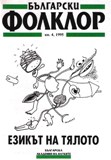Интерпретации на телесното в музикално-фолклорния инструментализъм
Interpretations of the Corporal in the Instrumentalism of Music Folklore
Author(s): Nataliya RashkovaSubject(s): Anthropology
Published by: Институт за етнология и фолклористика с Етнографски музей при БАН
Summary/Abstract: The article treats objectivization of the corporal in the concept and practice of folklore instrumental performance. The folklore material points at the conclusion that the man representing different cultures has principally similar attitude towards the realization of music. Since ancient times the man compares the musical instrument and its sound with his own body and voice. Initially the man found the instruments on his body – clapping bands, clattering, beating his thighs. Music begins as a movement of the body. In construction and character of the sound the most ancient instruments are an extension and enlargement of bodily organs. The sound and the timbre, which the man aims but cannot produce by his body, are achieved by adding new elements to it. The body-instrument is able to sound in a different way. Akin instrumental corporal expression by the cow-bells in the mummer’s ritual, by the women’s metal jewellery, the wooden spoons and other devices in the dance do exist in the Bulgarian folklore. In folklore culture the man equals the instrument with his own body, assigns to it his corporal features and qualities, connects its sound with his voice. Sometimes this is a reflection of the mythological thought. The musical instrument is interpreted as a synonym of the human body in some ritual practices and is described in the same way in the picturesque world of the Bulgarian riddles. Anthropomorphic signs of the instruments are preserved in the names of some of their constituents. The sound is likened to a voice and speaking. The man must have special physical behaviour and performance techniques to produce a sound on his instrument. The analysis of the interaction between the body of the musician and the “body” of the instrument shows that the physical qualities are in agreement with the optimal choice of a suitable instrument. The interdependences and the effect of the corporal organs on the quality of the instrumental sound are well known in musical practice. Achievement of a better sound and timbre depends on the sound obtained by fingers, mouth and other parts of the body or their substitutes. The difference in the corporal effects upon the instrument also influences the formation and differentiation of the styles in instrumental performance.
Journal: Български фолклор
- Issue Year: XXI/1995
- Issue No: 4
- Page Range: 42-56
- Page Count: 15
- Language: Bulgarian
- Content File-PDF

